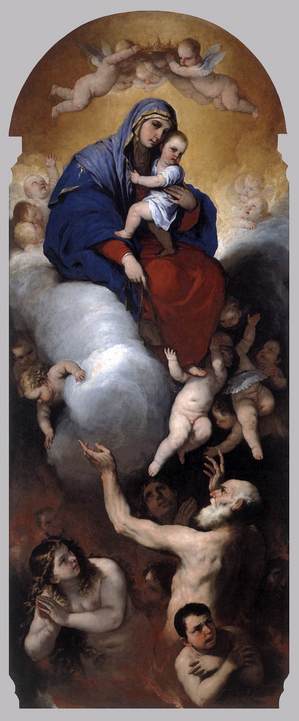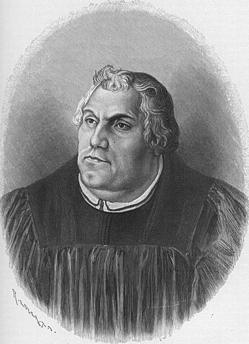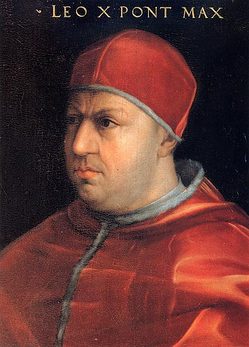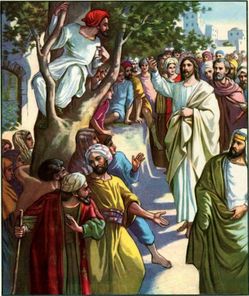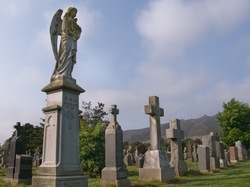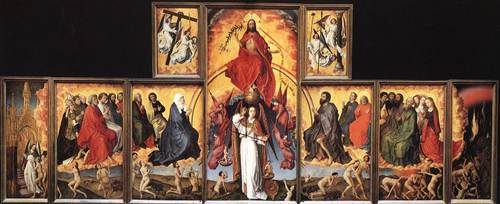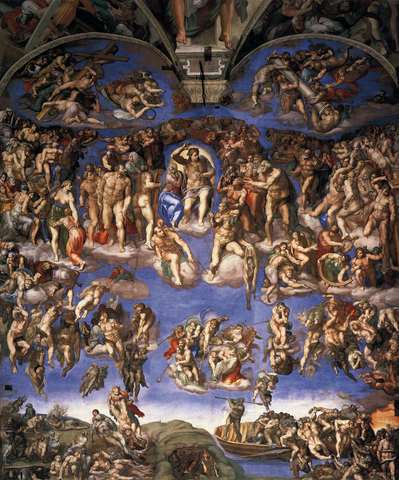Tag: All Souls
Forgiven by the grace of Christ, a homily for All Saints & All Souls in light of indulgences and the Reformation
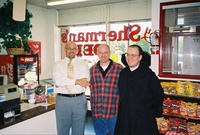
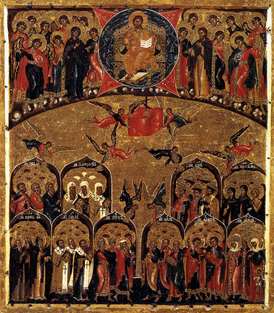
After earth’s Exile, I hope to go and enjoy You in the Fatherland, but I do not want to lay up merits for heaven. I want to work for Your Love alone with the one purpose of pleasing You, consoling Your Sacred Heart, and saving souls who will love You eternally.In the evening of this life, I shall appear before You with empty hands, for I do not ask You, Lord, to count my works. All our justice is stained in Your eyes. I wish, then, to be clothed in Your own Justice and to receive from Your Love the eternal possession of Yourself. I want no other Throne, no other Crown but You, my Beloved!
I never approved of a schism, nor will I approve of it for all eternity…. That the Roman Church is more honored by God than all others is not to be doubted. St. Peter and St. Paul, forty-six Popes, some hundreds of thousands of martyrs, have laid down their lives in its communion, having overcome Hell and the world; so that the eyes of God rest on the Roman Church with special favor. Though nowadays everything is in a wretched state, it is no ground for separating from the Church. On the contrary, the worse things are going, the more should we hold close to her, for it is not by separating from the Church that we can make her better. We must not separate from God on account of any work of the devil, nor cease to have fellowship with the children of God who are still abiding in the pale of Rome on account of the multitude of the ungodly. There is no sin, no amount of evil, which should be permitted to dissolve the bond of charity or break the bond of unity of the body. For love can do all things, and nothing is difficult to those who are united (Martin Luther to Pope Leo X, January 6, 1519).
Truer words were never spoken! How unspeakably sad that Luther finally decided not to send this letter to the Pope. How differently things might have turned out if Luther had sent it, and if the German princes had not gotten involved!
Praying for the dead, All Souls
Month of All Souls comes to an end
The other day my mother and I had the opportunity to visit one of the cemeteries where some our family’s dead rest. Today, my parents went to the other cemetery to make a visit and offer prayer. These visits made me think. The gives us an opportunity to make an act of devotion which annually begins on November 2nd and is carried through the month of November. Namely, Mass are said, prayers offered for the dead and we make visits to the cemetery to keep alive the names/memory of our deceased family and friends’ in front of God by asking God to be mindful of our loved ones with mercy. Hence, we pray for the dead, for those in purgatory (those who are saved but not yet with God in heaven) with the hope that one day they will see God face to face. You will recall that the only ones in heaven besides the Blessed Trinity and the Theotokos are the saints. Saint Robert Bellarmine said that those in purgatory are close to God and so having knowledge that they are saved, their prayers are effective for us. Hence, we pray for them, they for us.
Honoring the dead, the companionship of saints–the Catholic way
… while we visit cemeteries, let us remember that there, in
the tombs, only the mortal remains of our loved ones rest, while awaiting the
final resurrection. Their souls — as Scripture says — already “are in
the hand of God” (Wisdom 3:1). Hence, the most appropriate and effective
way to honor them is to pray for them, offering acts of faith, hope and
charity. In union with the Eucharistic sacrifice, we can intercede for their
eternal salvation, and experience the most profound communion while awaiting to
be reunited again, to enjoy forever the love that created us and redeemed us.
… how beautiful and consoling is the communion of saints! It is a
reality that infuses a different dimension to our whole life. We are never
alone! We form part of a spiritual “company” in which profound
solidarity reigns: the good of each one is for the benefit of all and, vice
versa, the common happiness is radiated in each one. It is a mystery that, in a
certain measure, we can already experience in this world, in the family, in
friendship, especially in the spiritual community of the Church. May Mary Most
Holy help us to walk swiftly on the way of sanctity and show herself a Mother
of mercy for the souls of the deceased. (Pope Benedict XVI, Angelus Address, November 2, 2009)
No such thing as a dead saint
The expression “a living saint” can be misleading. Certainly, we have encountered people in our own lives who fit that description, as best as we can judge. The Holy Church makes the final decision about saints. We celebrate them especially on All Saints’ Day, and on All Souls’ Day, we pray for our loved ones who are drawing more closely into the aura of holiness. The saints on the calendar are only the tip of the iceberg, and most of the saints who have ever existed are known to God alone. Perhaps churches should have a shrine to “The Unknown Saint” quite as we have a Tomb of the Unknown Soldier. All Saints’ Day is rather like that.
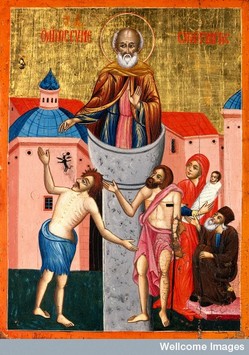 My point, though, is that there is no such thing as a dead saint.There are saints alive now, and there are saints who have physically died, but all are alive in Christ and they are “busy” in heaven, to use a temporal metaphor. Some saints capture the popular imagination more in one generation than in another. For instance, St. Simon Stylites was admired in Syria in the fifth century for spending most of his life seated on top of a pillar. That is not a useful model for our day, although some may still remember Flagpole Kelly, and not long ago thousands of New Yorkers went to watch a man spend a week on top of a column up the street in Bryant Park.
My point, though, is that there is no such thing as a dead saint.There are saints alive now, and there are saints who have physically died, but all are alive in Christ and they are “busy” in heaven, to use a temporal metaphor. Some saints capture the popular imagination more in one generation than in another. For instance, St. Simon Stylites was admired in Syria in the fifth century for spending most of his life seated on top of a pillar. That is not a useful model for our day, although some may still remember Flagpole Kelly, and not long ago thousands of New Yorkers went to watch a man spend a week on top of a column up the street in Bryant Park.
Millions are drawn to Padre Pio, and some are compelled by an unmeasured fascination with his miraculous spiritual gifts, which were blessings indeed, rather than emulating his heroic humility and discipline. There remains an astonishing cult of St. Thérèse of Lisieux. She was almost the reverse of St. Pio: totally 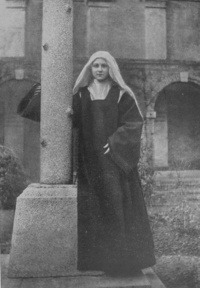 unknown in her earthly lifetime, and accomplishing nothing conspicuous to her contemporaries. She would have remained such had not her spiritual writings been discovered and published. Perhaps she fascinates precisely because in just barely 24 years on earth, she did the most ordinary things with most extraordinary joy. Whenever her relics are taken on pilgrimage to foreign lands (not to mention the one that was taken on a space shuttle), hundreds of thousands pour out to pray by them. This happened most recently in England, where the media were confounded by the huge crowds.
unknown in her earthly lifetime, and accomplishing nothing conspicuous to her contemporaries. She would have remained such had not her spiritual writings been discovered and published. Perhaps she fascinates precisely because in just barely 24 years on earth, she did the most ordinary things with most extraordinary joy. Whenever her relics are taken on pilgrimage to foreign lands (not to mention the one that was taken on a space shuttle), hundreds of thousands pour out to pray by them. This happened most recently in England, where the media were confounded by the huge crowds.
Concurrent with that phenomenon, there were astonishing developments in long-moribund Christian life there, not least of which was the announcement of the first papal state visit to Britain and the expected beatification of John Henry Newman, who predicted a “Second Spring” of Faith in England. Then came news of an Apostolic Constitution, which will provide a unique canonical structure to welcome those desiring union with the Catholic Church. Pope Benedict XVI, who well deserves the title “The Pope of Unity,” has shown the power of the intercessions of the saints.
Rev’d Fr. George Rutler
Church of Our Saviour, NYC
November 1, 2009
All Souls Indulgence
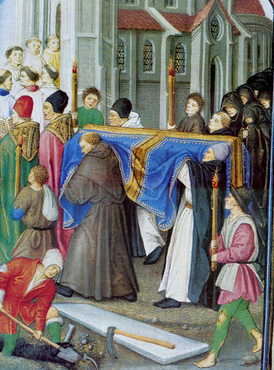 Eternal rest grant unto them, O Lord, and let the radiance of your light shine forever upon them (cf. 2 Es 2:35).
Eternal rest grant unto them, O Lord, and let the radiance of your light shine forever upon them (cf. 2 Es 2:35).
V. To you our praise is due in Zion,
O God.
R. To you we pay our vows, you who hear our prayer; to you all flesh will come (Ps 64:2-3).
Requirements for Obtaining a Plenary Indulgence on All Souls Day (November 2 )
– Piously visit a church to pray for the faithful departed
– Say one “Our Father” and the “Creed” in the visit to the church
– Say one “Our Father” and one “Hail Mary” for the intentions of the Pope
– Worthily receive Holy Communion (ideally on the same day)
– Make a Sacramental Confession within a week of (before or after) All Souls Day
– that one be free from all attachment to sin, even venial sin.
Requirements for Obtaining a Plenary Indulgence from November 1 to 8
– Devoutly visit a cemetery and pray for the dead.
– Say one “Our Father” and one “Hail Mary” for the intentions of the Pope
– Worthily receive Holy Communion (ideally on the same day)
– Make a Sacramental Confession within a week of (before or after) All Souls Day
– that one be free from all attachment to sin, even venial sin.
The “technical” things on Indulgences (so that we don’t fall into error)…from the Handbook of Indulgences, Norms:
“1. An indulgence is the remission in the eyes of God of the temporal punishment due to sins whose culpable element has already been taken away. The Christian faithful who are rightly disposed and observe the definite, prescribed conditions gain this remission through the effective assistance of the Church, which, as the minister of redemption, authoritatively distributes and applies the treasury of the expiatory works of Christ and the Saints.”
“22. The prescribed work for gaining a plenary indulgence attached to a church or oratory is a devout visit there, which includes the recitation of the Lord’s Prayer and the Creed (Pater Noster and Credo), unless otherwise stated in a specific grant.”
“23. 1. Besides the exclusion of all attachment to sin, even venial sin, the requirements for gaining a Plenary Indulgence are the performance of the indulgenced work and fulfillment of three conditions: Sacramental Confession, Eucharistic Communion, and prayer for the Pope’s intentions.
2. Several Plenary Indulgences may be gained on the basis of a single Sacramental Confession; only one may be gained, however, on the basis of a single Eucharistic Communion and prayer for the Pope’s intentions.
3. The three conditions may be carried out several days preceding or following performance of the prescribed work. But it is more fitting that the Communion and the prayer for the Pope’s intentions take place on the day the work is performed.
4. If a person is not fully disposed or if the prescribed work and the three mentioned conditions are not fulfilled, the Indulgence will only be partial …”
5. The condition requiring prayer for the Pope’s intentions is satisfied by reciting once the Our Father and Hail Mary for his intentions (Pater Noster and Ave Maria); nevertheless all the faithful have the option of reciting any other prayer suited to their own piety and devotion.”
From the Handbook of Indulgences, Grants
67. Visiting a Church or an Oratory on All Souls Day
A Plenary Indulgence, which is applicable only to the Souls in Purgatory is granted to the Christian faithful who devoutly visit a church or an oratory on (November 2nd,) All Souls Day.
13. Visiting a cemetery
An indulgence is granted the Christian faithful who devoutly visit a cemetery and pray, if only mentally, for the dead, This indulgence is applicable only to the souls in purgatory. This indulgence is a plenary one from November 1 through November 8 and can be granted on each one of these days. On the other days of the year this indulgence is a partial one.
All Souls
All Souls
The Commemoration of all the Faithful Departed -All Souls–follows the Solemnity of All Saints. The Church’s remembrance of our deceased friends and loved dates back to Saint Isidore of Seville’s Rule for Monks but it wasn’t until the monks of the Abbey of Cluny under the leadership of Abbot Odilio, who in 998 ordered all the Cluniac houses to observe a day in which the dead were prayerfully remembered. By the 13th century the custom was extended to the entire Church in the West; the Churches in the East have a similar day depending on what ecclesiastical community we are talking about. The custom of singing the Dies Irae set the tone and theology of this observance; today one rarely hears the Dies Irae sung in parishes because it is considered a “downer” and thus completely neglecting what the hymn says; it seems, however, to be making a come-back (even the 1928 BCP included the Dies Irae post World War I) as an apt expression of grief rooted not in civil secularity but in theology reminding faithful that we neither make not sustain ourselves. This feast like all other liturgical feasts points to God and to his love and mercy more than to us and our to condition.
An excerpt of an oration of Saint Gregory of Nazianzus
“What is man that you should be mindful of him, mere mortal that you should care for him?” What is this new mystery confronting me? I am both small and great, both lowly and exalted, mortal and immortal, earthly and heavenly. I am to be buried with Christ and rise again with him, to become a co-heir with him, a son of God, and indeed God himself.
This is what the great mystery means for us; this is why God became man and became poor for our sake: it was to raise up our flesh, to recover the divine image in us, to re-create mankind, so that all of might become one in Christ who perfectly became in us everything that he is himself. So we are no longer to be “male and female, barbarian and Scythian, slave and free” -distinctions deriving from the flesh–but to bear within ourselves only the seal of God, by whom and for which we were created. We are to be so formed and molded by him that we are recognized as belonging to his one family.
If only we could be now what we hope to be, by the great kindness of our generous God! He asks so little and gives so much in this life and in the next, to those who love him sincerely. In a spirit of hope and out of love for God, let us then “bear and endure all things” and give thanks for everything that befalls us, since even reason can often recognize these things as weapons to win salvation. Meanwhile let us commend to God our own souls and the souls of those who, being more ready for it, have reached the place of rest before us although they walked the same road as we do now.
Lord and creator of all, and especially of your human creatures, you are the God and Father and rule of your children; you are the Lord of life and death; you are the guardian and benefactor of our souls. You fashion and transform all things in their due season through your creative Word, as you know to be best in your deep wisdom and providence. Receive this day those who have gone ahead of us in our journey from this life.
(Gregory of Nazianzus, Oration 7, 23-24; PG 35, cols 786-7; ET by ICEL)
V. From the gate of hell.
R. Deliver their souls, O Lord.
V. May they rest in peace.
R. Amen.
V. O Lord, hear my prayer.
R. And let my cry come unto Thee.
V. The Lord be with you.
R. And with your spirit.
Let us pray.
O God, Creator and Redeemer of all the faithful, grant to the souls of Thy servants and handmaids the remission of all their sins, that through our devout prayers they may obtain pardon which they have always desired. Who lives and reigns with God the Father in the unity of the Holy Spirit, God, world without end. Amen.
V. Eternal rest grant unto them, O Lord.
R. And let perpetual light shine upon them. Amen.
